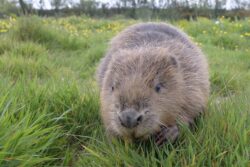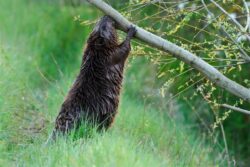 Abraham Lincoln
If given the truth, the people can be depended upon to meet any national crisis...
Abraham Lincoln
If given the truth, the people can be depended upon to meet any national crisis...
 Guildford news...
for Guildford people, brought to you by Guildford reporters - Guildford's own news service
Guildford news...
for Guildford people, brought to you by Guildford reporters - Guildford's own news service
Wildlife Group Plans To Release Beavers To Revive Surrey Wetlands
Published on: 15 Apr, 2025
Updated on: 16 Apr, 2025

Releasing beavers into the wild will bring huge conservation benefits, says Surrey Wildlife Trust
By David Reading
Conservationists have launched a major project to release beavers into the wild in Surrey.
Surrey Wildlife Trust (SWT) believes bringing back this long-lost native species could revive wetland habitats for plants and animals on a large scale.
The SWT is asking people to back the project with donations, saying: “This could see beavers – nature’s top engineers – transform Surrey’s best-loved habitats into oases bursting with life.”
Conservationists at the Trust hope to use Eurasian beavers, which once thrived throughout the UK but were hunted to extinction some 400 years ago, to re-wet areas of habitat in Surrey, enabling them to reach their full potential as homes for nature.
As they consider a licence to release Beavers, they must conduct studies to fully assess the potential effectiveness and impact of the animals on Trust reserves.
From April 22-29, all donations to enable this research to go ahead will be match-funded to a total value of £50,000 by the Green Match Fund, a group of philanthropists who support ideas to protect the environment.
This appeal is part of the Trust’s £1m “Save Surrey’s Nature” campaign, which has so far raised almost £400,000 to help fight back against the destruction of nature.
The SWT says evidence shows that rewetting habitats by creating ponds, ditches and marshy areas and allowing natural watercourses to develop through creating dams delivers benefits including:
- Carbon sequestration – wetlands, particularly where they sit on reserves of peat, are hugely effective ‘carbon sinks’, helping reduce the impacts of climate change.
- Flood alleviation – creating habitats that can hold back or absorb water significantly reduces run-off in times of high rainfall, thus reducing damage to habitats, property and infrastructure.
- Wildfire prevention and containment – fires cannot spread where there are bodies of water to stop them.
- Creation of habitat – to benefit a huge range of native plant and animal species, including species that are currently locally extinct.
The SWT says it is helping to deliver the national and international goal of protecting 30 per cent of land and sea for nature. In support of this vital objective, they say, beavers could be key to restoring and extending Surrey’s wet habitats – as they have started to do in parts of the UK, including Devon.
Eight of the animals are reported to have saved Czech taxpayers at least a million Euros by flooding a protected former army training site where a long-delayed dam was planned.

A law change may enable Eurasian beavers to be legally released into the wild as early as this year
The SWT says beavers’ habit of creating dams and felling some bankside trees creates natural bodies of water of varying sizes and depths that can then benefit nature with minimum investment and interference from people.
SWT Conservation Manager Adam Bolton says:
“We’re asking people to help us put nature’s top engineers back at the heart of our landscapes, to help shape them for the better. Given the essential services that nature provides, from flood prevention to carbon sequestration to better health and wellbeing, that would be something for everyone to celebrate.”
The beavers would need to be carefully introduced – so the first phase of the project is to deploy expert advisors as well as the Trust’s own land management team and local stakeholders to establish how to proceed.
Donations are initially being sought to support a detailed feasibility study into the Beaver reintroductions, and where it would be best to consider these first; and to enable an assessment of other habitat engineering options, using mechanical or manual methods for rewetting habitats.
The government recently announced that it will change the law to enable Eurasian beavers to be legally released into the wild as early as this year.
In addition to European beavers, the SWT plans to explore the feasibility of introducing other species to enhance the lowland heath habitat.
Candidates include the large marsh grasshopper, red deer and the red-backed shrike
Responses to Wildlife Group Plans To Release Beavers To Revive Surrey Wetlands
Leave a Comment Cancel reply
Please see our comments policy. All comments are moderated and may take time to appear. Full names, or at least initial and surname, must be given.
Click on cartoon for Dragon story: Public Asked for Views on SCC’s Proposal for Reduced Speed Limits


Recent Articles
- Local MPs Vote in Favour of Assisted Dying
- Merger Between Reigate & Banstead and Crawley Councils Ruled Out
- ‘Politics Is Not Always a Kind Place’ Says Dismissed Lead Councillor
- Letter: It’s Almost Like We Have Been Abandoned By the Council
- Failure of Woking’s Over-ambitious Project Acknowledged
- Comment: What Can Be Done About Guildford’s Biggest Empty Shop?
- Mayor’s Diary: June 20 – July 6
- A281 At Shalford Has Now Reopened Following Repairs to Damaged Roof
- Frimley Park at the Beginning of the Hospital Rebuild Queue
- Letter: Council Has Quietly Relieved Developer of £Million Obligation


Recent Comments
- Ben Paton on ‘Politics Is Not Always a Kind Place’ Says Dismissed Lead Councillor
- Angela Gunning on ‘Politics Is Not Always a Kind Place’ Says Dismissed Lead Councillor
- Nigel Keane on A281 At Shalford Has Now Reopened Following Repairs to Damaged Roof
- N Hatcher on New Electric Trains Now Arriving at Guildford – 100 Years After the First One Did
- John Lomas on Letter: Recreational Rowing Might Be the Answer
- David Roberts on ‘Politics Is Not Always a Kind Place’ Says Dismissed Lead Councillor
Search in Site
Media Gallery
Dragon Interview: Local Artist Leaves Her Mark At One of England’s Most Historic Buildings
January 21, 2023 / No Comment / Read MoreDragon Interview: Lib Dem Planning Chair: ‘Current Policy Doesn’t Work for Local People’
January 19, 2023 / No Comment / Read MoreA3 Tunnel in Guildford ‘Necessary’ for New Homes, Says Guildford’s MP
January 10, 2023 / No Comment / Read More‘Madness’ for London Road Scheme to Go Ahead Against ‘Huge Opposition’, Says SCC Leader
January 6, 2023 / No Comment / Read MoreCouncillor’s Son Starts Campaign for More Consultation on North Street Plan
December 30, 2022 / No Comment / Read MoreCounty Council Climbs Down Over London Road Works – Further ‘Engagement’ Period Announced
December 14, 2022 / No Comment / Read MoreDragon Interview: GBC Reaction to the Government’s Expected Decision to Relax Housing Targets
December 7, 2022 / No Comment / Read MoreHow Can Our Town Centre Businesses Recover? Watch the Shop Front Debate
May 18, 2020 / No Comment / Read More






Roger Kendall
April 15, 2025 at 5:02 pm
Until the full disaster of beavers in wilder places has been fully studied no one should think of them being introduced into crowded Surrey.
I thought we were also trying to grow trees to tackle climate change. Beavers are great at destroying trees, and productive land. The few struggling farmers left in the county need help not hindrance.
In certain areas the damage beavers cause is offset by the wild areas that result but not here, however cute they are.
James Pearson
April 15, 2025 at 8:54 pm
I think this is a crazy idea.
Reintroducing beavers to block up our water courses! The watercourses are already blocked up by lack of maintenance which is causing high water tables and surface water flooding everywhere.
Far better to reintroduce land drainage departments in local councils (which went extinct about 15 years ago) to get our water dispelled to rivers and out to sea. This is another vanity project that will cause more flooding.
Ricky Sonn
April 29, 2025 at 9:50 pm
Humans covering land with concrete and artificial grass is a much bigger cause than beavers would ever be even if there were 70 million of them!
Roland Dunster
April 15, 2025 at 10:30 pm
Absolutely fantastic news and I urge all those who care for nature and wish to protect, enhance, expand and connect our landscapes and seascapes for the benefit wildlife and ourselves, to donate to this appeal.
Becoming a member of the Surrey Wildlife Trust, the National Trust, the RSPB and CPRE – the Countryside Charity would also aid these goals considerably.
In a world that can seem incredibly bleak at times, being a contributor to the great work they all do is truly uplifting.
Paul Robinson
April 16, 2025 at 1:32 pm
How do beavers get on with Mink? Last year’s broods of goslings and ducklings didn’t last more than a week around Riverside Park and the river.